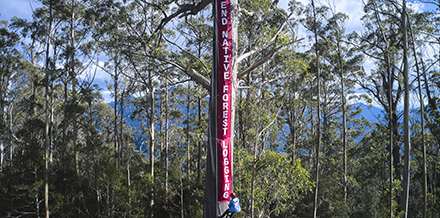Sustainable Timber Tasmania and the Bob Brown Foundation have reached an agreement with STT agreeing to halt logging in 49 coupes in the North Eastern tiers. Sources: Mercury, Timberbiz
The agreement means a Federal Court injunction battle scheduled for Monday this week did not go ahead.
STT had already agreed to halt logging in 19 coupes, but has now added a further 30 to its no-go list after coming to an agreement this week.
The Mercury in Hobart reported this week that the injunction application had been an interim measure to stop logging the coupes in question while both sides awaited a decision from the full bench of the Federal Court over the legality of Tasmania’s Regional Forest Agreement (RFA).
The BBF lodged the injunction with the Federal Court on September 30, seeking to prevent forestry activity in the 19 coupes to stop the logging of trees “essential to Tasmania’s critically endangered swift parrot”. A decision in the Federal Court case is expected next month.
The foundation has argued the RFA is illegal as it allows the destruction of swift parrot habitat, even while the birds are nesting and feeding there.
“This is a breakthrough but it should never have been necessary,” former Greens leader Bob Brown said.
“It’s a reprieve for the swift parrot because people cared.”
But Sustainable Timber Tasmania has cautioned against the misinterpretation of the moratorium.
Tasmanian Forest Products Association chief executive Nick Steel said it was wrong for anybody to call the agreement “a win”.
“This is simply a case of STT voluntarily agreeing to a further moratorium in order to avoid costly court action for all parties, pending the outcome of the Federal Court case which we all hope will be sooner rather than later,” Mr Steel said.
“Anyone trying to claim this as some sort of win is completely wrong, and is engaging in deceptive spin.”
Mr Steel said there were numerous causes of decline for the swift parrot population.
“The causes of decline in swift parrot populations are complex and include nest predation by sugar gliders, collision mortality, competition from other bird species, climate variability and change, and illegal wildlife capture and trading, as well as habitat loss,” Mr Steel said.
“Research has highlighted the significant impact of predation by sugar gliders.
“If current trends continue in the increasing sugar glider predation rates, a catastrophic decline in the swift parrot population has been predicted.”






